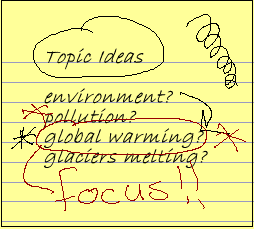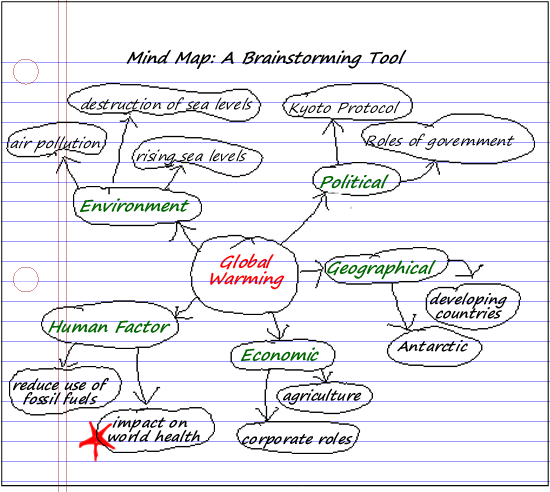Focus Your Topic
Once you have a topic that you like, it's likely that you'll need to focus it, or narrow it down. Most students start out with topics that are way too broad for their assignments. If your topic is too broad, your research will be much more difficult, and you'll waste a lot of time looking for information that you won't use.
 For example. if you try searching for information on global warming, you will quickly be overwhelmed. Global warming is a large subject, covering a variety of disciplines, topics and issues. How can you narrow this topic?
For example. if you try searching for information on global warming, you will quickly be overwhelmed. Global warming is a large subject, covering a variety of disciplines, topics and issues. How can you narrow this topic?
Brainstorm Again
Jot down all the ideas and questions you might already have about the topic:
- What do you know about global warming? What don't you know?
- Is there a geographical area you want to focus on?
- Are there individuals or organizations involved in this issue?
- What are some areas impacted by global warming?
- Environmental
- Political
- Economic
- Human element.
It may help to set up a table or chart moving from the general topic to narrower topics:
| Topic | Narrower Topic | Even Narrower |
|---|---|---|
| Global Warming | » Environment | » rising sea levels » destruction of rain forests » air pollution |
| » Political | » Kyoto Protocol » roles of government |
|
| » Human Element | » impact on world health » reducing use of fossil fuel |
|
| » Economic | » agriculture » role of corporations |
|
| » Geographical | » developing countries |
|
| » Antarctic region |
If the chart is too formal for you, you might like making a mindmap or concept map. A whiteboard or a big piece of paper are all you need to make a mindmap. Here's the same information as above, but in a mindmap: 
The secret to mindmapping is to free yourself from rules. Don't worry about grammar, spelling, or formatting. Just jot down ideas until you can't think of anymore, then go back and make connections between the ideas. If an idea appeals to you, make it the center idea on a new piece of paper and brainstorm more details.

